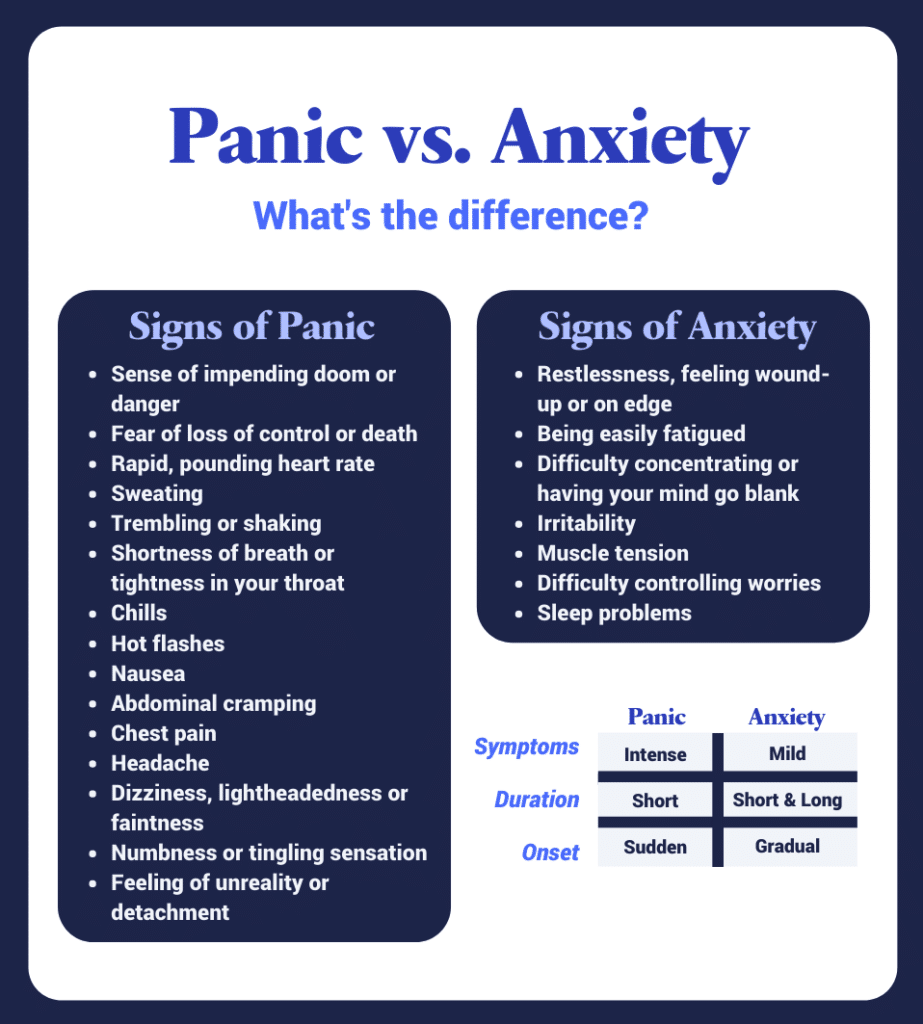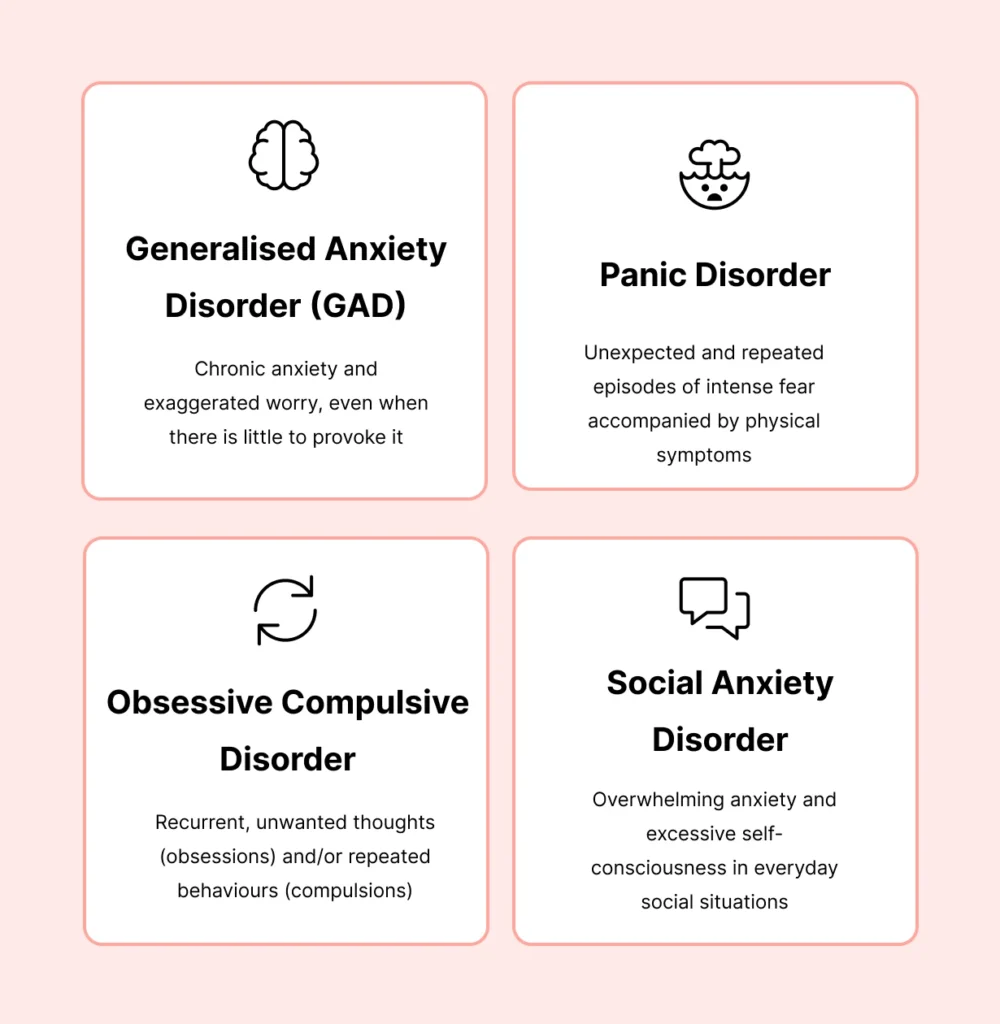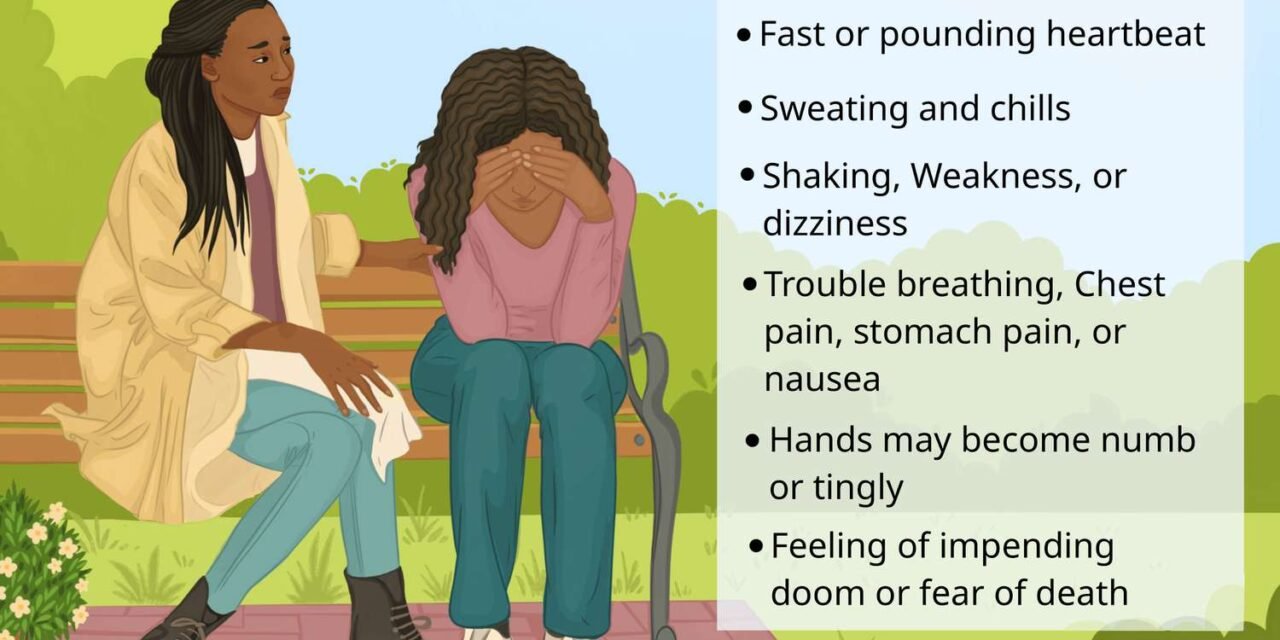Introduction to the Anxiety and Panic Disorders:
Anxiety and panic disorders are common mental health conditions that can deeply affect a person’s daily life. Anxiety is a feeling of worry, nervousness, or fear about what might happen in the future. It’s natural to feel anxious at times, like before a big event or during stressful situations. But when these feelings become overwhelming, last for a long time, or occur without a clear reason, they may be signs of an anxiety disorder.
Panic disorders, on the other hand, are characterized by sudden and intense episodes of fear, often accompanied by physical symptoms like a racing heart, shortness of breath, and dizziness. These are called panic attacks and can feel very frightening.People with anxiety disorders may struggle with constant worry about everyday situations, even when there’s no immediate danger. For example, they might worry excessively about their health, relationships, or work. This can lead to physical symptoms like headaches, muscle tension, or trouble sleeping.
In severe cases, it can even prevent them from doing things they enjoy or need to do. Panic disorders are slightly different because they involve unpredictable episodes of intense fear. During a panic attack, a person might feel like they’re losing control, having a heart attack, or even dying. These episodes can happen anywhere, like in the middle of a grocery store or while driving, making it hard for someone to feel safe or secure.The exact causes of anxiety and panic disorders are not fully understood, but they are believed to result from a mix of genetics, brain chemistry, and life experiences.
For instance, people who have a family history of these conditions might be more likely to develop them. Stressful life events, such as losing a loved one or going through financial troubles, can also trigger or worsen anxiety and panic disorders. In some cases, these disorders are linked to other mental health issues like depression.The good news is that anxiety and panic disorders can be managed effectively with the right help.

Treatment often involves a combination of therapy and medication. Cognitive-behavioral therapy (CBT) is one of the most common forms of therapy used to help people understand and change negative thought patterns that contribute to their anxiety. Medications like antidepressants or anti-anxiety drugs can also help balance brain chemicals that play a role in these conditions. Additionally, lifestyle changes like regular exercise, a healthy diet, mindfulness, and good sleep hygiene can make a big difference.
If you or someone you know is struggling with anxiety or panic disorders, it’s important to seek help. These conditions are not a sign of weakness or something to be ashamed of. Millions of people around the world deal with similar challenges, and support is available. Talking to a doctor or mental health professional is the first step toward feeling better and regaining control over your life.
Benefits of Addressing Anxiety and Panic Disorders:
Taking steps to understand and manage anxiety and panic disorders can bring numerous benefits to a person’s overall well-being. While these conditions may feel overwhelming at times, seeking treatment and adopting healthy coping strategies can lead to significant improvements in both mental and physical health.
1. Improved Mental Health:
Addressing anxiety and panic disorders helps reduce constant worry and fear, creating a sense of calm and stability. Treatment enables people to think more clearly, focus better on tasks, and enjoy activities that may have once felt impossible due to overwhelming anxiety. This can lead to a more positive outlook on life.
2. Better Physical Health:
Anxiety and panic attacks often cause physical symptoms like headaches, muscle tension, rapid heartbeat, and digestive problems. Managing these conditions can alleviate such symptoms, improving energy levels and overall physical health. Stress reduction also lowers the risk of chronic conditions like high blood pressure or heart disease.
3. Stronger Relationships:
Anxiety can sometimes strain relationships with family, friends, or coworkers. By learning to manage these feelings, individuals can communicate more effectively and build stronger, healthier connections with those around them. This also reduces feelings of isolation or loneliness.
4. Increased Confidence
When someone learns to control their anxiety or panic attacks, they feel more empowered to face challenges and take on new opportunities. This boost in self-confidence can positively impact personal and professional growth.

5. Enhanced Productivity:
Anxiety often interferes with focus and productivity, making even simple tasks feel overwhelming. By reducing anxiety, individuals can improve their ability to stay organized, meet deadlines, and achieve their goals, whether in school, work, or other areas of life.
6. Better Sleep:
Anxiety and panic disorders frequently disrupt sleep, causing insomnia or restless nights. Treating these conditions can help restore a healthy sleep cycle, allowing individuals to wake up feeling refreshed and ready to tackle the day.
7. Greater Resilience:
Overcoming anxiety and panic disorders teaches valuable coping skills, such as stress management and emotional regulation. These skills can be applied to future challenges, helping individuals handle life’s ups and downs with greater resilience.
8. A Happier Life:
Most importantly, addressing anxiety and panic disorders allows individuals to reclaim their lives. They can participate in social events, pursue hobbies, travel, and enjoy the things they love without being held back by fear or worry.Seeking help for anxiety and panic disorders can open the door to a healthier, more fulfilling life. It’s a journey worth taking, with long-lasting benefits for both the mind and body.
Disadvantages of Anxiety and Panic Disorders:
Living with anxiety and panic disorders can bring several challenges that affect various aspects of life. These disadvantages often make daily activities harder and can lead to long-term complications if left untreated. Understanding these effects can highlight the importance of seeking help and finding ways to manage these conditions.
1. Emotional Distress:
Anxiety and panic disorders cause constant feelings of worry, fear, or dread. This emotional turmoil can make it difficult to experience joy, relaxation, or a sense of peace. Over time, it may lead to feelings of hopelessness, frustration, or being overwhelmed.
2. Physical Health Issues:
Anxiety can have significant physical effects, including headaches, stomach problems, muscle tension, and fatigue. Panic attacks, in particular, may cause chest pain, rapid heartbeat, shortness of breath, and dizziness, which can feel terrifying and exhausting. Chronic stress associated with anxiety may also increase the risk of heart disease, high blood pressure, and weakened immunity.
3. Social Isolation:
People with anxiety and panic disorders often avoid social situations for fear of judgment or triggering an attack. This avoidance can lead to loneliness, strained relationships, and a lack of support from friends and family. Social withdrawal can also make it harder to maintain a healthy work-life balance.
4. Impaired Productivity:
Anxiety makes it hard to concentrate, stay organized, and complete tasks. For those with panic disorders, the unpredictability of attacks can disrupt daily routines. This can lead to missed deadlines, poor performance at work or school, and a lack of motivation to pursue goals.
5. Impact on Relationships:
Anxiety and panic disorders can strain personal and professional relationships. Constant worrying or fear may lead to misunderstandings, conflicts, or emotional distance. Loved ones might feel helpless or unsure of how to provide support, further complicating the relationship.
6. Financial Strain:
Managing anxiety and panic disorders often requires therapy, medications, or other treatments, which can be costly. Additionally, if anxiety interferes with work performance or leads to missed opportunities, it can impact financial stability.
7. Dependence on Coping Mechanisms:
Some people turn to unhealthy coping mechanisms, such as excessive use of alcohol, drugs, or overeating, to numb their anxiety. These habits can create additional problems, including addiction, weight gain, or poor overall health.
8. Reduced Quality of Life:
Anxiety and panic disorders can limit a person’s ability to enjoy life. Fear of triggering symptoms might prevent them from traveling, attending events, or pursuing hobbies. Over time, this restricted lifestyle can lead to a sense of dissatisfaction or unfulfilled potential.While these disadvantages highlight the significant impact anxiety and panic disorders can have, it’s important to remember that these conditions are treatable. With proper care, individuals can overcome these challenges and regain control of their lives.
Question answers
Here are some common questions and their answers related to anxiety and panic disorders:
1. What is anxiety?
Anxiety is a natural emotional response to stress or danger. It involves feelings of worry, nervousness, or fear about something that might happen. However, when these feelings become intense, persistent, or overwhelming, it may indicate an anxiety disorder.
2. What are panic disorders?
Panic disorders are mental health conditions characterized by sudden and unexpected episodes of intense fear, called panic attacks. These attacks often include physical symptoms like a racing heart, chest pain, or shortness of breath and can occur without an obvious trigger.
3. What causes anxiety and panic disorders?
The causes are not fully understood but may include.
Genetics:
Family history of anxiety disorders.Brain chemistry: Imbalances in brain chemicals like serotonin or dopamine.
Life experiences:
Stressful or traumatic events, such as loss or abuse.
Personality:
Certain traits, like being overly cautious, may increase the risk.
4. How do I know if I have anxiety or a panic disorder?
Some signs include:Constant worrying or fear that disrupts daily life.Physical symptoms like headaches, tension, or rapid heartbeat.Avoidance of certain places or situations.Recurring panic attacks that make you fear having more.If these symptoms persist, it’s important to consult a mental health professional for a proper diagnosis.
5. Are anxiety and panic disorders treatable?
Yes, both are highly treatable. Common treatment options include.
Therapy:
Cognitive-behavioral therapy (CBT) helps manage negative thoughts.Medication: Anti-anxiety or antidepressant medications may be prescribed.
Lifestyle changes:
Regular exercise, healthy eating, mindfulness, and good sleep habits.
6. Can anxiety or panic disorders go away on their own?
Sometimes mild anxiety may improve with time and self-care. However, more severe cases or panic disorders often require professional treatment to manage symptoms effectively.
7. Can panic attacks harm me physically?
Panic attacks are not physically dangerous, though they can feel overwhelming. They do not cause heart attacks or lasting physical harm, but frequent attacks may increase stress on the body over time.
8. How can I help someone with anxiety or panic disorders?
Be patient and supportive; don’t dismiss their feelings.Encourage them to seek professional help.Avoid pressuring them into situations they’re uncomfortable with.Learn about anxiety to better understand their experience.
9. Are there any natural remedies for anxiety?
While natural remedies may not replace professional treatment, they can help manage symptoms. These include:Deep breathing exercises.Meditation and mindfulness practices.Herbal teas like chamomile or supplements like magnesium (consult a doctor first).
10. When should I see a doctor?
You should seek help if:Anxiety or panic symptoms interfere with daily life.Physical symptoms occur frequently, such as chest pain or dizziness.You feel unable to control your worries.Panic attacks occur repeatedly.Taking the first step toward getting help is essential for finding relief and improving your quality of life.
Conclusion:
Anxiety and panic disorders are challenging mental health conditions that can significantly impact a person’s emotional, physical, and social well-being. While they may feel overwhelming, it is important to remember that these disorders are treatable. Through proper therapy, medication, and lifestyle changes, individuals can manage symptoms, regain control over their lives, and improve their overall quality of life.
Seeking help is a sign of strength, not weakness, and it’s never too late to take the first step toward healing. Whether it’s by consulting a mental health professional or leaning on a support system of family and friends, addressing these issues can pave the way to a healthier and happier future. Remember, you are not alone, and help is always available.
you must watch 👁️👁️ this article 👇👇👇
Best CBD Gummies for Anxiety: What to Look For and Where to Start?





